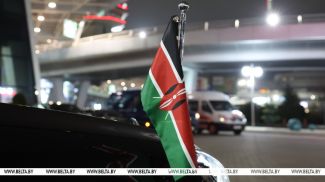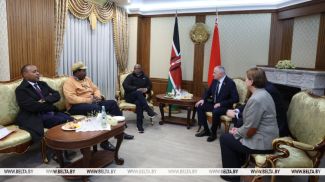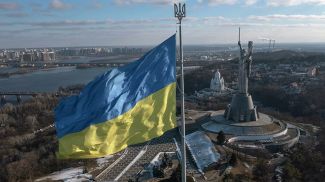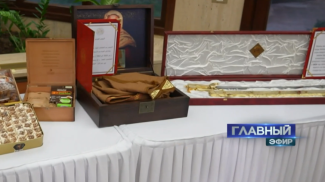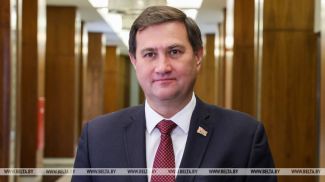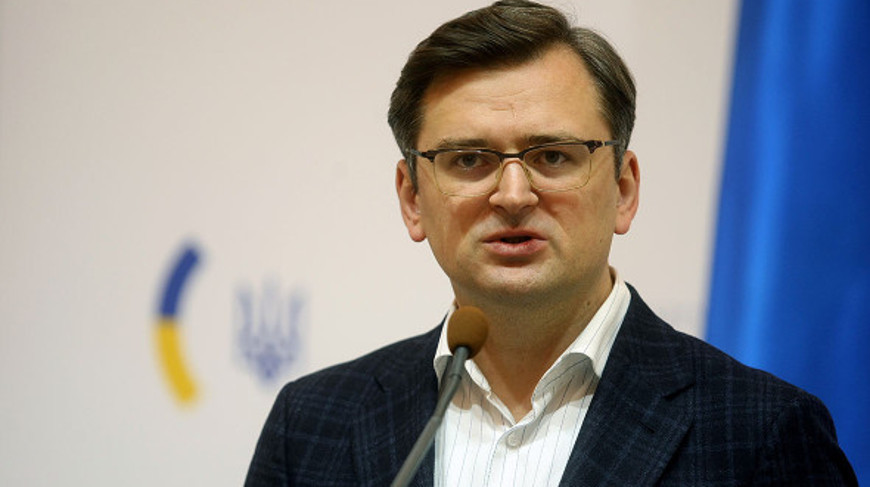
Ukrainian Foreign Minister Dmitry Kuleba visited China on 23-25 July. Given that Kiev's political compass has recently pointed strictly west, the Ukrainian diplomat's visit to the Celestial Empire made waves. The public had reasonable questions. Why did Kuleba “urgently” fly to China? What could Beijing offer Kiev? Was the visit approved by Washington? Or did Ukraine decide to push back on its Western curators? Finally, the main question: should we consider the negotiations in China as a prelude to a peaceful settlement of the conflict? Well, let's try to figure it out.
Urgent visit intimated by China. Will Kiev win Beijing over?
Kuleba's plans to visit China on 22 July were announced by the official representative of the Ukrainian Foreign Ministry Georgy Tikhy. According to him, the main topic of the talks was the search for ways to end the Ukrainian conflict and “China's possible role in achieving a sustainable and just peace.”
At the same time, Tikhy’s message implied that the talks were initiated by the Chinese side.
The news immediately went viral on Ukrainian media and Telegram channels. Some noted that Kuleba's visit was “urgent” and had been prepared at short notice. It was also noted that the foreign minister would spend THREE days in China. Usually, ministerial visits last one or two days.
This led to very hasty conclusions: the meeting meant to bring concrete results, and the Ukrainian minister would probably have to make phone calls to Kiev along the way to agree on the points of the peace agreement.
In general, the mood in the Ukrainian media swayed between two extremes - from “zrada” [betrayal] to “peremoga” [victory].
For instance, former Ukrainian MP Borislav Bereza pointed out that the invitation from the Chinese Foreign Ministry came after Russian leader Vladimir Putin visited North Korea and Vietnam. Thus the former MP drew uncomplicated conclusions. “This is an answer to Putin for his attempts to play in the zone of China's interests. The Kremlin understands this,” the Kommentarii website quoted the MP as saying.
There were also opposing opinions. “I am concerned a bit. It is unlikely that Kuleba will diplomatically outplay Russia and win China over,” Ukrainian journalist Tatiana Vysotskaya said.
The Forbes.ua website noted that Kuleba's trip was the first visit of a Ukrainian top official to China since the beginning of the conflict. It is also the first bilateral visit of the Ukrainian foreign minister to China since 2012. At the same time, the newspaper recalled that Beijing ignored the June peace summit in Switzerland despite the invitation from Ukraine.
Meanwhile, China already has their own plan to settle the Ukrainian conflict. This plan was developed jointly with Brazil and consists of six points. “It calls for de-escalation and negotiations, but has no concrete proposals, nor does it require de-occupation of Ukrainian territories,” Forbes.ua said.
For its part, the Ukrainian daily Strana noted that the Chinese peace plan differs not only from Kiev's formula, but also from the things the Russian president recently voiced. “Beijing offered to freeze the war along the front line by starting negotiations. Whereas the Kremlin, as a pre-condition, demands that the four southeastern regions be handed over to it. Apparently, this is what Ukrainian diplomacy plans to emphasize - to make Moscow reduce its demands, down to what China offers. After that, a window for negotiations will open. All the more so because Zelensky has already repeatedly hinted that he is ready to postpone the issue of territories for later and wants to stop the war first,” the newspaper said.
However, the question arises: will China want to help Ukraine “persuade” Moscow? Such an option is possible, Strana believes. But there are conditions. First, Kiev must agree to a halt in hostilities along the front line. At the same time, the publication notes that Ukraine's demand that Moscow withdraw troops to the borders of 1991 or even 2022 is unfeasible. Second, China may want to launch its own summit based on its own peace initiative. “Whether the Ukrainian authorities are ready for such steps is still an open question,” Strana said.
A new geopolitical heavyweight. What is the U.S. concerned about?
U.S. State Department spokesman Matthew Miller commented on Kuleba's visit to China during a press briefing. In response to a question from journalists, he said that he was not going to speculate on whether China's position on the situation in Ukraine and relations with Moscow might change.
Miller once again accused China of supporting Russia's defense capability. And once again he did not provide any evidence for his accusations.
At the same time, the State Department representative said that the Ukrainian conflict cannot be called a war, which “just magically appeared out of nowhere, and neither side is responsible”. Miller placed all responsibility for the situation in the region on Russia.
The State Department representative also said that Kiev had always been ready for peace talks with Russia. The State Department does not seem to know that Ukraine has formalized a ban on negotiations with Moscow. Neither had they heard that Kiev unilaterally withdrew from the negotiation process in the spring of 2022.
Journalists asked Miller about Secretary of State Anthony Blinken's “interaction” with Kuleba before his meeting with China's foreign minister. However, the State Department spokesman evaded answering, saying he did not understand the question. Miller then added that Blinken is in constant touch with Kuleba.
In general, judging by reports in U.S. media, Washington is more concerned about China’s growing role in the international arena rather than the situation in Ukraine.
CNN, the mouthpiece of the White House, pointed out that two delegations, from Palestine and Ukraine, traveled to China in the same week. “China’s top diplomat Wang Yi has had a busy week in which two devastating conflicts have loomed large. Wang started by gathering 14 Palestinian factions for reconciliation talks in Beijing, including bitter rivals Hamas and Fatah, before meeting on Wednesday with the Ukrainian counterpart,” the channel reported.
CNN notes that “the juxtaposed diplomacy – where talks were closely linked to the grinding wars in Gaza and Ukraine, respectively – came as Beijing vies to present itself as a geopolitical heavyweight in a world increasingly divided by both conflicts.”
Urgent visit intimated by China. Will Kiev win Beijing over?
Kuleba's plans to visit China on 22 July were announced by the official representative of the Ukrainian Foreign Ministry Georgy Tikhy. According to him, the main topic of the talks was the search for ways to end the Ukrainian conflict and “China's possible role in achieving a sustainable and just peace.”
At the same time, Tikhy’s message implied that the talks were initiated by the Chinese side.
The news immediately went viral on Ukrainian media and Telegram channels. Some noted that Kuleba's visit was “urgent” and had been prepared at short notice. It was also noted that the foreign minister would spend THREE days in China. Usually, ministerial visits last one or two days.
This led to very hasty conclusions: the meeting meant to bring concrete results, and the Ukrainian minister would probably have to make phone calls to Kiev along the way to agree on the points of the peace agreement.
In general, the mood in the Ukrainian media swayed between two extremes - from “zrada” [betrayal] to “peremoga” [victory].
For instance, former Ukrainian MP Borislav Bereza pointed out that the invitation from the Chinese Foreign Ministry came after Russian leader Vladimir Putin visited North Korea and Vietnam. Thus the former MP drew uncomplicated conclusions. “This is an answer to Putin for his attempts to play in the zone of China's interests. The Kremlin understands this,” the Kommentarii website quoted the MP as saying.
There were also opposing opinions. “I am concerned a bit. It is unlikely that Kuleba will diplomatically outplay Russia and win China over,” Ukrainian journalist Tatiana Vysotskaya said.
The Forbes.ua website noted that Kuleba's trip was the first visit of a Ukrainian top official to China since the beginning of the conflict. It is also the first bilateral visit of the Ukrainian foreign minister to China since 2012. At the same time, the newspaper recalled that Beijing ignored the June peace summit in Switzerland despite the invitation from Ukraine.
Meanwhile, China already has their own plan to settle the Ukrainian conflict. This plan was developed jointly with Brazil and consists of six points. “It calls for de-escalation and negotiations, but has no concrete proposals, nor does it require de-occupation of Ukrainian territories,” Forbes.ua said.
For its part, the Ukrainian daily Strana noted that the Chinese peace plan differs not only from Kiev's formula, but also from the things the Russian president recently voiced. “Beijing offered to freeze the war along the front line by starting negotiations. Whereas the Kremlin, as a pre-condition, demands that the four southeastern regions be handed over to it. Apparently, this is what Ukrainian diplomacy plans to emphasize - to make Moscow reduce its demands, down to what China offers. After that, a window for negotiations will open. All the more so because Zelensky has already repeatedly hinted that he is ready to postpone the issue of territories for later and wants to stop the war first,” the newspaper said.
However, the question arises: will China want to help Ukraine “persuade” Moscow? Such an option is possible, Strana believes. But there are conditions. First, Kiev must agree to a halt in hostilities along the front line. At the same time, the publication notes that Ukraine's demand that Moscow withdraw troops to the borders of 1991 or even 2022 is unfeasible. Second, China may want to launch its own summit based on its own peace initiative. “Whether the Ukrainian authorities are ready for such steps is still an open question,” Strana said.
A new geopolitical heavyweight. What is the U.S. concerned about?
U.S. State Department spokesman Matthew Miller commented on Kuleba's visit to China during a press briefing. In response to a question from journalists, he said that he was not going to speculate on whether China's position on the situation in Ukraine and relations with Moscow might change.
Miller once again accused China of supporting Russia's defense capability. And once again he did not provide any evidence for his accusations.
At the same time, the State Department representative said that the Ukrainian conflict cannot be called a war, which “just magically appeared out of nowhere, and neither side is responsible”. Miller placed all responsibility for the situation in the region on Russia.
The State Department representative also said that Kiev had always been ready for peace talks with Russia. The State Department does not seem to know that Ukraine has formalized a ban on negotiations with Moscow. Neither had they heard that Kiev unilaterally withdrew from the negotiation process in the spring of 2022.
Journalists asked Miller about Secretary of State Anthony Blinken's “interaction” with Kuleba before his meeting with China's foreign minister. However, the State Department spokesman evaded answering, saying he did not understand the question. Miller then added that Blinken is in constant touch with Kuleba.
In general, judging by reports in U.S. media, Washington is more concerned about China’s growing role in the international arena rather than the situation in Ukraine.
CNN, the mouthpiece of the White House, pointed out that two delegations, from Palestine and Ukraine, traveled to China in the same week. “China’s top diplomat Wang Yi has had a busy week in which two devastating conflicts have loomed large. Wang started by gathering 14 Palestinian factions for reconciliation talks in Beijing, including bitter rivals Hamas and Fatah, before meeting on Wednesday with the Ukrainian counterpart,” the channel reported.
CNN notes that “the juxtaposed diplomacy – where talks were closely linked to the grinding wars in Gaza and Ukraine, respectively – came as Beijing vies to present itself as a geopolitical heavyweight in a world increasingly divided by both conflicts.”
“Wang’s week of diplomacy offered a chance to play up desired optics: framing the country as a productive player in intractable conflicts – and an alternative broker to the United States,” CNN reported.
Meanwhile, the Associated Press effectively admitted that Kiev no longer counts on Western partners. Now all the hopes of the Ukrainian authorities in the conflict resolution are associated with China. “Kuleba was expected to lobby Chinese officials to attend another peace conference planned for sometime before the American presidential election in early November. His visit reflects a calculation that any peace deal favorable to Ukraine would likely be a non-starter without China on board.”
We will not tow the line. Has Kiev changed its mind?
Upon arriving in Guangzhou on 23 July, Kuleba posted a video on social media outlining the goals of his visit to China. They sounded quite upbeat. Thus, the minister remarked that the issue of peace would top the agenda of the negotiations and that Kiev needs to move towards a fair and sustainable peace.
“There will be extensive, detailed, substantive negotiations focused on one issue - peace in Ukraine. We will talk, we will be looking for common ground. We need to avoid competition between peace plans. We need to move towards a fair and sustainable peace. China can play an important role here,” the diplomat said.
It should be noted that the Ukrainian side sticks to the so-called Zelensky peace formula, which implies a cessation of hostilities and a return to the 1991 borders. Such a condition is not workable today and suggests that Kiev is not going to come to the negotiating table.
Yet, recent statements by Ukraine could be interpreted as a change of heart. Here is what the Strana media outlet wrote: “Last week, Vladimir Zelensky made several statements that he is ready for negotiations with Russia during the second summit on Ukraine, and also wants peace as soon as possible and even suggests that the “hot phase of the war” could end by the end of the year... Why would he make all these statements? Western media see them as the outcome of the difficult situation that Ukraine is facing on the frontline, as well as uncertainty regarding the West’s support provided Donald Trump is re-elected U.S president. Zelensky has recently stated several times that he is ready to negotiate with Russia and to stop the war without reclaiming the lost territories. In other words, he seems to have dropped the previous demand for the withdrawal of Russian troops and the restoration of its 1991 post-Soviet borders. This is perceived as Kiev signaling intentions to end the war in the near future.”
However, the Ukrainian authorities have already demonstrated their ability to do an about-face within a split second. One of the examples came at the very beginning of the conflict, when Kiev suddenly withdrew from the Istanbul agreements.
And now we see Kuleba talking out of both sides of his mouth.
Following the meeting with Wang Yi, the Ukrainian foreign minister said that Ukraine is ready to engage in dialogue and negotiations with Russia, but in the future. And again he recalled Zelensky's peace formula, which is not feasible in its core.
“The minister briefed his colleague on the results of the peace summit and explained the logic of further steps in implementing the peace formula. Dmitry Kuleba restated Ukraine's established position that it is ready to engage the Russian side in the negotiation process at a certain stage, when Russia is ready to negotiate in good faith, but emphasized that no such readiness is currently observed on the Russian side," the Ukrainian Ministry of Foreign Affairs said in its commentary on Kuleba’s visit to China.
At the end of his trip to China, Kuleba posted another video where he said that Kiev “will not budge” to ultimatums coming from Russia or “any part of the world”.
He also noted that Kiev is ready for negotiations with Russia if two conditions are met. “First, no agreements about Ukraine without Ukraine. Second...full respect for Ukraine's sovereignty and territorial integrity. If these two principles are adhered to, we can engage in any discussions and seek any solutions,” the diplomat said.
He went on saying that during his visit to China, the parties separately discussed bilateral relations. According to Kuleba, China is interested in growing trade with Ukraine, and overall in promoting bilateral relations with Ukraine,” Kuleba said.
Thus, the Ukrainian foreign minister reduced the visit to China, which was initially portrayed as an attempt to lay ground for long-awaited peace talks, to business talks.
Late in the evening of 25 July, the TSN TV channel aired an interview with Kuleba, in which he took stock of the outcomes of his visit to China. It boils down to two key points. Firstly, Kuleba remarked that Beijing calls the current conflict ‘Ukraine crisis’, and not a war, including during negotiations with Ukraine. Secondly, answering the question whether he believes China could side with Ukraine, Kuleba said that China will only side with China.
In addition, Kuleba failed to answer whether China will take part in the second peace summit.
Obviously, the Chinese side has sent a clear message to Kiev, and hence to the West. Kuleba's vague statements only suggest that Western players have not been able to make Beijing tow their line.
Meanwhile, the Associated Press effectively admitted that Kiev no longer counts on Western partners. Now all the hopes of the Ukrainian authorities in the conflict resolution are associated with China. “Kuleba was expected to lobby Chinese officials to attend another peace conference planned for sometime before the American presidential election in early November. His visit reflects a calculation that any peace deal favorable to Ukraine would likely be a non-starter without China on board.”
We will not tow the line. Has Kiev changed its mind?
Upon arriving in Guangzhou on 23 July, Kuleba posted a video on social media outlining the goals of his visit to China. They sounded quite upbeat. Thus, the minister remarked that the issue of peace would top the agenda of the negotiations and that Kiev needs to move towards a fair and sustainable peace.
“There will be extensive, detailed, substantive negotiations focused on one issue - peace in Ukraine. We will talk, we will be looking for common ground. We need to avoid competition between peace plans. We need to move towards a fair and sustainable peace. China can play an important role here,” the diplomat said.
It should be noted that the Ukrainian side sticks to the so-called Zelensky peace formula, which implies a cessation of hostilities and a return to the 1991 borders. Such a condition is not workable today and suggests that Kiev is not going to come to the negotiating table.
Yet, recent statements by Ukraine could be interpreted as a change of heart. Here is what the Strana media outlet wrote: “Last week, Vladimir Zelensky made several statements that he is ready for negotiations with Russia during the second summit on Ukraine, and also wants peace as soon as possible and even suggests that the “hot phase of the war” could end by the end of the year... Why would he make all these statements? Western media see them as the outcome of the difficult situation that Ukraine is facing on the frontline, as well as uncertainty regarding the West’s support provided Donald Trump is re-elected U.S president. Zelensky has recently stated several times that he is ready to negotiate with Russia and to stop the war without reclaiming the lost territories. In other words, he seems to have dropped the previous demand for the withdrawal of Russian troops and the restoration of its 1991 post-Soviet borders. This is perceived as Kiev signaling intentions to end the war in the near future.”
However, the Ukrainian authorities have already demonstrated their ability to do an about-face within a split second. One of the examples came at the very beginning of the conflict, when Kiev suddenly withdrew from the Istanbul agreements.
And now we see Kuleba talking out of both sides of his mouth.
Following the meeting with Wang Yi, the Ukrainian foreign minister said that Ukraine is ready to engage in dialogue and negotiations with Russia, but in the future. And again he recalled Zelensky's peace formula, which is not feasible in its core.
“The minister briefed his colleague on the results of the peace summit and explained the logic of further steps in implementing the peace formula. Dmitry Kuleba restated Ukraine's established position that it is ready to engage the Russian side in the negotiation process at a certain stage, when Russia is ready to negotiate in good faith, but emphasized that no such readiness is currently observed on the Russian side," the Ukrainian Ministry of Foreign Affairs said in its commentary on Kuleba’s visit to China.
At the end of his trip to China, Kuleba posted another video where he said that Kiev “will not budge” to ultimatums coming from Russia or “any part of the world”.
He also noted that Kiev is ready for negotiations with Russia if two conditions are met. “First, no agreements about Ukraine without Ukraine. Second...full respect for Ukraine's sovereignty and territorial integrity. If these two principles are adhered to, we can engage in any discussions and seek any solutions,” the diplomat said.
He went on saying that during his visit to China, the parties separately discussed bilateral relations. According to Kuleba, China is interested in growing trade with Ukraine, and overall in promoting bilateral relations with Ukraine,” Kuleba said.
Thus, the Ukrainian foreign minister reduced the visit to China, which was initially portrayed as an attempt to lay ground for long-awaited peace talks, to business talks.
Late in the evening of 25 July, the TSN TV channel aired an interview with Kuleba, in which he took stock of the outcomes of his visit to China. It boils down to two key points. Firstly, Kuleba remarked that Beijing calls the current conflict ‘Ukraine crisis’, and not a war, including during negotiations with Ukraine. Secondly, answering the question whether he believes China could side with Ukraine, Kuleba said that China will only side with China.
In addition, Kuleba failed to answer whether China will take part in the second peace summit.
Obviously, the Chinese side has sent a clear message to Kiev, and hence to the West. Kuleba's vague statements only suggest that Western players have not been able to make Beijing tow their line.
About war and peace in Guangzhou. Why did Beijing invite Kuleba?
One more question remains open in this whole story: why did China invite Kuleba to the talks?
There are many possible answers. First, as Washington has already pointed out, China continues to gain weight in the political arena. After Beijing managed to resolve the long conflict between Saudi Arabia and Iran last year, China gained the image of a peacemaker in the international arena. Now Beijing is making diplomatic efforts to resolve the situation in Palestine. This week, 14 Palestinian factions, including Fatah and Hamas, signed a declaration in Beijing on ending 15-year division. This is another major success for Chinese diplomacy in the Middle East. Beijing's efforts in resolving the Ukrainian conflict are also well-known - from Xi Jinping's peace plan to working on the diplomatic track with the participation of China's special representative for Eurasia Li Hui. Therefore, Kuleba's invitation to China looks quite natural.
Secondly, Kiev has recently sent unequivocal signals of its desire to move towards a peaceful settlement of the conflict. In June, the Russian president announced the conditions for negotiations with Ukraine. Negotiations mean dialogue. Unlike the West, which defiantly refuses to invite Russia to its so-called peace conferences, China appears to be ready to provide a negotiating platform for both parties to the conflict. Kuleba's invitation can be seen as an attempt by Beijing to find out the real position of the Ukrainian authorities and whether Kiev is ready for dialogue.
According to the statement of the Chinese ministry of foreign affairs, Beijing has always been firmly committed to promoting a political solution to the crisis. The peace initiative was put forward by Chinese President Xi Jinping. China and Brazil have recently released a joint plan to resolve the conflict.
“China believes that all conflicts ultimately have to be resolved at the negotiating table. The solutions to any dispute can only be found through political means. Recently, both Ukraine and Russia have expressed to varying degrees the willingness to negotiate,” the Chinese diplomatic ministry said in a commentary.
The ministry admitted however that the conditions and timing were not yet ripe. Nevertheless, China is ready to continue to play a constructive role to enable a ceasefire and resume the peace talks.
It is worth noting that the Chinese foreign ministry's statement also outlined Kiev's position. At least as China understands it. “Ukraine has looked closely at the six common understandings issued by China and Brazil on the political settlement of the Ukraine crisis. Ukraine is willing and ready to have dialogue and negotiation with Russia,” the statement said.
However, it follows from the statement of the Chinese ministry of foreign affairs that Beijing had other topics for discussion in Guangzhou. In particular, China expressed concern about the risks of escalation and spread of the Ukrainian conflict. The issue was discussed during the meeting between Wang Yi and Kuleba. “Wang Yi noted that the Ukraine crisis has been in full escalation for nearly three years. The fighting is still ongoing, and the conflict could further escalate and spill over.” the Chinese foreign ministry said in a statement.
What is meant by escalation? For example, Washington's authorization of U.S. weapons strikes on Russian territory. The delivery of F-16 fighter jets to Kiev. French President Emmanuel Macron's statements about sending troops to Ukraine.
It is also worth mentioning NATO's attempts to involve Belarus in the Ukrainian conflict. Recently, Ukraine started to reinforce its military contingent directly near the Belarusian border. Belarus was forced to respond by strengthening the protection of the southern border, involving not only border guards, but also army units. Fortunately, as a result of negotiations, de-escalation was achieved and troops were withdrawn from the border. Nevertheless, the situation shows that there are forces that are trying to scale up the conflict.
Beijing certainly understands this. They demand from the USA and its allies not to add oil to the fire by fanning the flames of the conflict for selfish purposes.
Unclear signals. What is Moscow saying?
While there are contradictory statements about a peaceful settlement from Ukraine, Moscow's position on the matter is clear.
On 14 June, Russian President Vladimir Putin outlined specific conditions for the start of the negotiation process with Kiev at a meeting with the representatives of the Russian Ministry of Foreign Affairs.
First, Ukrainian troops must be completely withdrawn from the Donetsk and Lugansk People's Republics, Kherson Oblast and Zaporizhia Oblast. “Please note: it is the entire territory of these regions within their administrative borders that existed at the time of their entry into Ukraine,” Vladimir Putin explained.
Secondly, Ukraine must officially notify of its abandonment of plans to join NATO.
“As soon as Kiev declares that it is ready for such a decision and begins the actual withdrawal of troops from these regions, and also officially notifies about the abandonment of plans to join NATO - an order to cease fire and start negotiations will follow immediately from our side,” Vladimir Putin said.
Moscow is watching Kiev's statements and how Ukraine's rhetoric is changing. Russia, however, has serious doubts about the realism of the signals coming from Kiev, Kremlin spokesman Dmitry Peskov said.
“So far there has been no concrete substance to the negotiations. There are unclear signals, but we do not know how realistic they are. There is a ban in place for the Kiev regime to hold any negotiations with us. There are no specifics yet,” Dmitry Peskov told Izvestia when asked whether Moscow had received any concrete signals from any political forces in Ukraine indicating readiness for compromises.
Dmitry Peskov also said that Moscow envisages different options for negotiations on Ukraine, although it is not an easy issue, given Zelensky's status after the expiration of his term. “The issue is not an easy one. From the legal point of view this problem is on the agenda, but from the practical point of view we are open to achieving our goals through negotiations. Therefore, different options are possible here,” Dmitry Peskov said.
The Kremlin spokesman pointed out that first there is a need to understand how ready Ukraine is for negotiations and what permission it has from its handlers. “So far there have been very different statements. It is not quite clear yet,” he said.
It is unlikely that Ukraine itself fully understands what course to take next. Kiev's political compass is set exclusively towards what the Ukrainian authorities crave most of all - the West. But what if the path to peace lies in the opposite direction? It seems that Ukraine's political elites will have to get priorities straight. The time for unclear signals cannot last forever.
Vita Khanatayeva
BelTA




